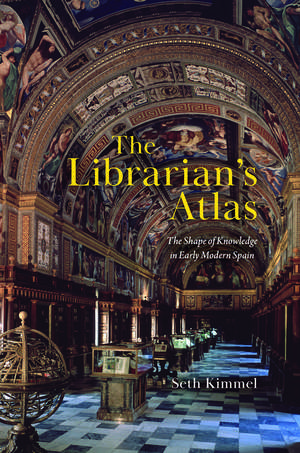The Librarian's Atlas: The Shape of Knowledge in Early Modern Spain
Autor Seth Kimmelen Limba Engleză Hardback – 6 mai 2024
Medieval scholars imagined the library as a microcosm of the world, but as novel early modern ways of managing information facilitated empire in both the New and Old Worlds, the world became a projection of the library. In The Librarian’s Atlas, Seth Kimmel offers a sweeping material history of how the desire to catalog books coincided in the sixteenth and seventeenth centuries with the aspiration to control territory. Through a careful study of library culture in Spain and Morocco—close readings of catalogs, marginalia, indexes, commentaries, and maps—Kimmel reveals how the booklover’s dream of a comprehensive and well-organized library shaped an expanded sense of the world itself.
Preț: 281.62 lei
Nou
Puncte Express: 422
Preț estimativ în valută:
53.91€ • 55.45$ • 44.73£
53.91€ • 55.45$ • 44.73£
Carte disponibilă
Livrare economică 29 ianuarie-12 februarie
Livrare express 15-21 ianuarie pentru 33.74 lei
Preluare comenzi: 021 569.72.76
Specificații
ISBN-13: 9780226833170
ISBN-10: 0226833178
Pagini: 272
Ilustrații: 20 halftones
Dimensiuni: 152 x 229 x 23 mm
Greutate: 0.48 kg
Editura: University of Chicago Press
Colecția University of Chicago Press
ISBN-10: 0226833178
Pagini: 272
Ilustrații: 20 halftones
Dimensiuni: 152 x 229 x 23 mm
Greutate: 0.48 kg
Editura: University of Chicago Press
Colecția University of Chicago Press
Notă biografică
Seth Kimmel is associate professor of Latin American and Iberian cultures at Columbia University. He is the author of Parables of Coercion: Conversion and Knowledge at the End of Islamic Spain, also published by the University of Chicago Press.
Cuprins
List of Figures
Introduction Books in Place
One Hernando Colón’s Cosmography
Two Routes of Antiquarianism: From Seville to San Lorenzo
Three A Universal Library for Philip II: Juan Páez de Castro and the Escorial’s Order of Knowledge
Four Biblioteca and Biblia: Benito Arias Montano’s Logics of Place
Five This Holy Land: Semitic Philology and Peninsular Toponymy
Six Spanish Orientalism and Saʿadī Cultures of the Catalog
Conclusion: “Libraries” and the Shape of Knowledge
Acknowledgments
Notes
Bibliography
Index
Introduction Books in Place
One Hernando Colón’s Cosmography
Two Routes of Antiquarianism: From Seville to San Lorenzo
Three A Universal Library for Philip II: Juan Páez de Castro and the Escorial’s Order of Knowledge
Four Biblioteca and Biblia: Benito Arias Montano’s Logics of Place
Five This Holy Land: Semitic Philology and Peninsular Toponymy
Six Spanish Orientalism and Saʿadī Cultures of the Catalog
Conclusion: “Libraries” and the Shape of Knowledge
Acknowledgments
Notes
Bibliography
Index
Recenzii
“The Librarian’s Atlas is an early modern booklover’s dream. It invites the reader to peer over the shoulder of the creative act of world-making that took place in early modern Spanish libraries. As Kimmel masterfully shows, these libraries were not passive book repositories but vibrant and intellectually stimulating sites of knowledge creation. Their contents and organization were also political projects essential to the formation of a modern understanding of the world."
“If every book is a world in itself, then a library is a collection of worlds that invites practices of mastery to keep readers afloat in an ocean of paper. Librarians, scholars, translators, and booksellers must define coordinates and draw maps to organize such an atlas. Focusing on the Escorial’s foundation in San Lorenzo and unfolding metaphors around the concept of the bibliotheca, Kimmel offers a fascinating archaeology of intellectual technologies in early modern Europe.”
“Kimmel’s brilliant book recovers nothing less than the relationship between the library and the world at a time of unprecedented intellectual and political ambition. They came together, above all, in the complex called the Escorial, created by King Philip II and his successors outside Madrid, and Kimmel offers our richest account to date of its origins, evolutions, and afterlives.”
